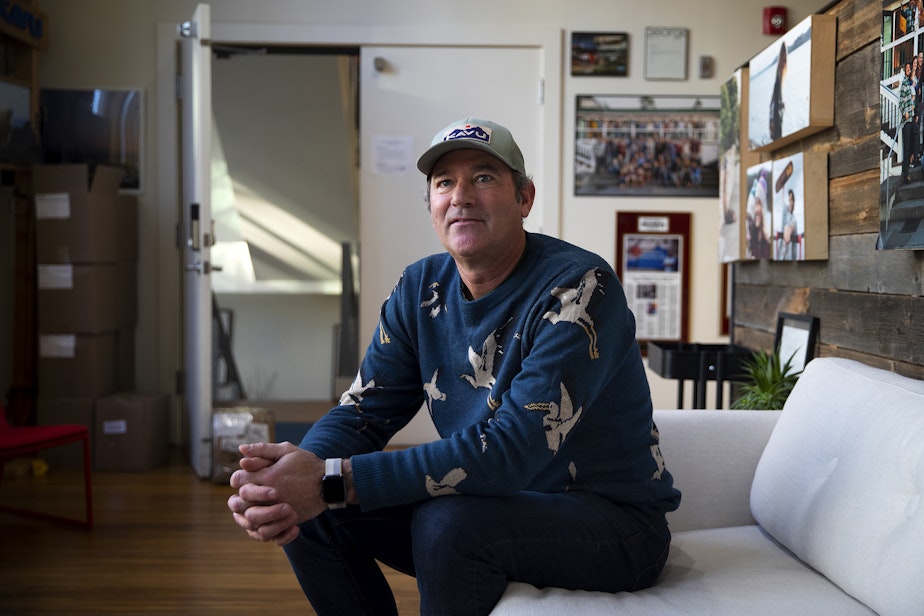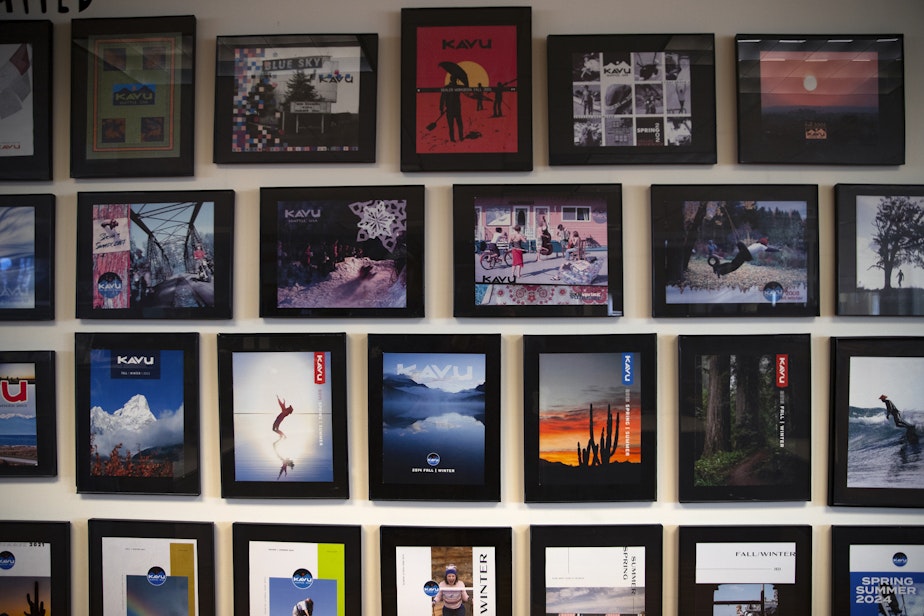As countries lob tariffs, this small Seattle business hunkers down

New U.S. tariffs on China come on top of existing tariffs that have plagued clothing company KAVU for years. Now, its owner fears higher prices could push customers away. "No one's gonna buy a $200 fleece," he says.
Barry Barr started KAVU in 1993 with a simple idea: Hats with straps on them, so they won't blow off your head in the wind. He called them "strap caps."
He teamed up with a local artisan, who perfected the idea and started sewing them.
"There were a lot of good sewers in Seattle at the time," Barr recalled.
Then, Barr would sell them at trailheads near Seattle.
"I was trying to see if this idea would stick and would go to any place where there was outdoor people, sometimes even Green Lake, where there were people walking around — Hey, set up a little table and try to sell some hats," he said.
Sponsored
Today, KAVU, an acronym which somehow stands for "clear above, visibility unlimited," has grown to 18 people, and they've expanded their catalog to include fleece, pants, shirts, bags, and more. They work in a strangely-shaped building just north of the Ballard Bridge.
That artisan that originally teamed up with Barr to make hats still makes some of KAVU's products in West Seattle.
But the the largest share of KAVU's stuff comes from factories in China, followed by Vietnam, India, and Nepal.
Listen to the full story on KUOW's economics podcast, Booming:
K
AVU has a wall of polaroid photos in its Ballard office. Each photo shows one piece from the outdoor clothing company's Fall 2026 line, which will feature bright colors inspired by sunsets. On each photo is a sticky note showing the price.
The company works up to two years ahead of time, determining how much it will produce based on how many advance orders its salespeople secure.
Barr is worried about the tariffs because they could push the numbers on those sticky notes higher. That could mean his team would have to go back to the stores, and say, "We can't deliver these clothes at the price we promised." Stores could end up backing out of his contracts.
"The price at retail is going to be so high, you won't be able to sell it," he said. "No one's going to buy a $200 fleece jacket."
Sponsored
During the last Trump administration, tariffs grew to 15% after China retaliated, before settling down to a lower 7.5% on clothes.
New 10% tariffs on China are being applied on top of old tariffs, which include not only the first Trump tariffs, but historical tariffs that vary by product, which for some of KAVU’s products are as high as 32%.
With the future unknown, Barr sometimes fears the worst: That tariffs could push his company out of business.
"It's going to be devastating on our livelihood and everyone that's employed at this company," he said.
So why can't KAVU bring its manufacturing to the U.S., avoiding tariffs altogether?
"People ask me that all the time," Barr said. "It's not that easy. When we make something in the U. S., you've got to design to the capabilities of the factories here."
He says those factories cannot compete in quality with the factories overseas, in part because those places have a whole ecosystem of businesses built up there.
You can get high-quality technical fabrics, thread, buckles, Velcro, and webbing, like in the back of a hat. These are all available close to the factories.
The U. S. still makes a few things like denim and some canvas. But those are not part of a robust ecosystem like you see in places like China.
Sponsored
Barr said even when the canvas that KAVU uses is made from cotton grown in the U. S., that cotton has to go to Pakistan in order to get woven, dyed, and then washed, at least if they want to meet Barr's standards.
And so, while KAVU works with local artisans when it can, Barr says his company absolutely depends on imports.

E
ven if a company says they're stuck importing from overseas, there are little things they can do to try to cut down on their tariff loads.
One strategy is called "tariff engineering."
That means changing a product so that it fits into a lower-tariff category in the labyrinthine Harmonized Tariff Schedule of the United States.
That's why Converse All Star shoes come with a thin layer of felt on the bottom, which quickly wears away: so they can qualify as slippers, which have a lower duty.
Then there's the Chapstick pocket, or "nurse's pocket," near the bottom of some women's shirts made by the sportswear company Columbia. A pocket below the waistline, however useless, has a lower tariff than shirts without one.
Tariff engineering is too risky for KAVU, Barr said, because customs enforcement is often subjective, and an agent could decide a Chapstick pocket doesn't meet the tariff's definition.
"They're going to come back and hit you with the actual duty," he said. "So we don't want to mess around with them at all. We want to be as straight and legal as we can."
Such disputes over tariff rates often end up in court, such as when Toy Biz, Inc. had to convince a judge that Spider-Man is not human.
It was part of an argument that Spider-Man action figures were not "Dolls, representing only human beings, clothed or unclothed, up to 33 inches in height," but were rather, "Other toys representing animals or non-human creatures (for example, robots and monsters)," which are taxed at around half the rate.
In her decision about Spider-Man (which included the X-Men, who are not men, but mutants), Judge Judith Barzilay sided with the importer. "Even though 'dolls' can be caricatures of human beings, the court is of the opinion that the freakishness of the figure's appearance coupled with the fabled 'Spider-Man' storyline to which it belongs does not warrant a finding that the figure represents a human being," Barzilay said.
Spider-Man got the lower tariff rate.
While a larger company probably has the resources to fight such a case in court, smaller companies are less likely to have those resources.
And besides, tariff engineering doesn't work on broad tariffs without few exemptions, such as the new tariff on China.
Still, KAVU can pursue safer forms of tariff engineering, such as making its shirts out of more cotton than polyester, since cotton is taxed at a lower rate (16% for some clothes) than polyester (32%). A 50/50 cotton/poly blend is too risky — 60% cotton is much safer. The little labels in your shirt collar make that perfectly clear to the customs agent, along with material testing results, just in case there's any skepticism.
T
ariffs, like the China tariffs, often start out broad and simple. But over time, they tend to grow more complex, as companies with influence (like Apple) convince leaders to carve out exemptions for them.
"Some industries have very strong interest groups that have very strong lobbying power and can make a case that is really persuasive to the government," said University of Washington Professor Debra Glassman, who teaches finance and business economics. "Small businesses tend not to have that kind of lobbying power."

Then, there's the matter of retaliation by other countries in response to U.S. tariffs, which can also sweep up small businesses.
Those tariffs often hit home states of influential members of Congress, which is why so many countries retaliate with tariffs on Kentucky Bourbon, home to influential U.S. Sen. Mitch McConnell.
"Our trading partners know what the game is," Glassman said. "And they also easily can see where the political power is in the U.S."
None of these are things Barry Barr of KAVU can control.
For now, he takes a small amount of comfort in the fact that, at least for the moment, most clothing manufacturers are paying the same tariff, so KAVU's prices won't stand out above the rising tide.




